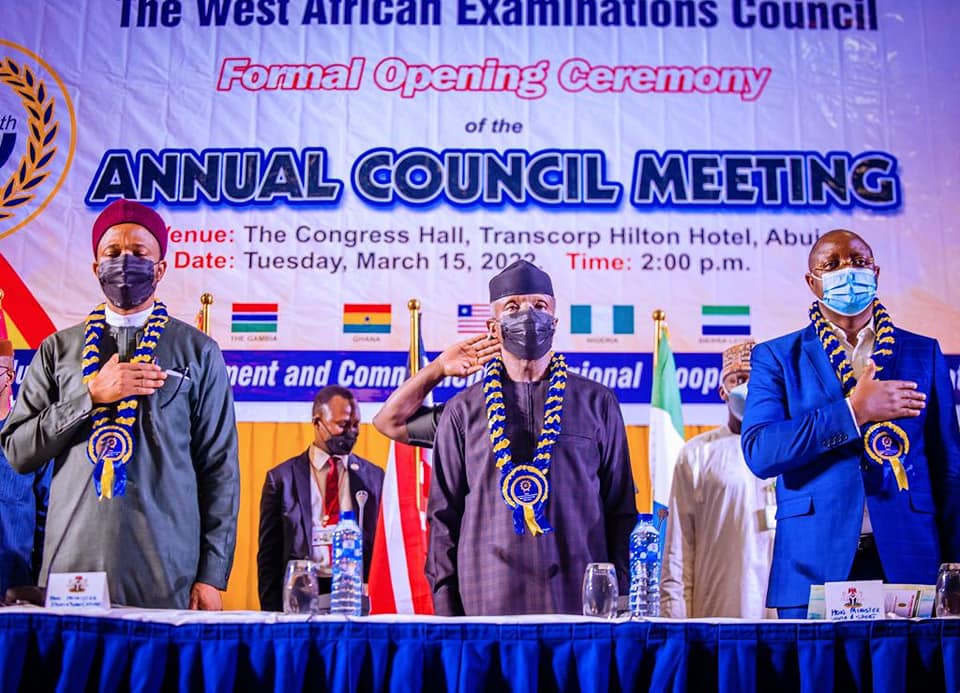
Vice President Yemi Osinbajo has tasked the West African Examinations Council with the need to ensure its curriculum reflects the 21st-century reality.
This, he said, will ensure Africa bridge the gap in areas of world-class young people with strong interpersonal, innovative, entrepreneurial, critical, and creative thinking skills needed for development in the digital age.
Osinbajo made the call on Tuesday in Abuja while formally declaring open the 70th Annual Council Meeting of WAEC, according to a statement on Wednesday by his spokesman, Laolu Akande.
According to him, the future of Nigerian and regional institutions like the WAEC will depend on how well they embrace technological innovations and their ability to reinvent themselves.
Highlighting key areas, the examination body could prepare better and innovate for the future, Osinbajo noted that critical thinking, creativity, imagination, problem-solving skills, and collaboration, are essential skills that young people need to be competitive and prepared for life and work in a global economy.
Urging the body to design its curriculum further to test for and support these core skills, he advised that “the Africa that WAEC must prepare our children for should be one that will need world-class young people who have strong interpersonal, innovative, entrepreneurial, critical and creative thinking skills amongst others.”
While the Vice President noted that “WAEC has shown through the years that it has the capacity and dynamism to evolve and remain relevant” in an ever-changing world, he emphasized the need to embrace more innovation across the board.
Pointing out to major significant changes in work-life balance, business, and the global economy in the 21st century, Osinbajo observed that “with amazing advances in technology, talent is more mobile, and there is greater competition for well trained, innovative and resourceful Human Resources. The twenty-first-century economy requires a different skill set – problem solving and innovation are key requirements.”
“It is clear that the future of all our institutions including WAEC will depend on how well they embrace technological innovations and their ability to reinvent themselves in this ever-changing world. WAEC has shown through the years that it has the capacity and dynamism to evolve and remain relevant.”
He added that with seventy years behind the examination body, it was time for WAEC to begin to prepare for the next 70 years, adding that “It is clear that these coming decades will come with vastly different challenges and opportunities.”
Osinbajo, however, pointed out some key areas that he noted would present new challenges and opportunities for innovation.
“The first is the African Continental Free Trade Area (AfCFTA) and the second is curriculum, teaching, and examination relevant to the 21st century needs. A third issue is the role of technology in the work of WAEC,” he noted.
He further stated that it was crucial that “WAEC must continually embrace Technology, there is no option today. And we must commend WAEC for the technological innovations it has implemented so far, which include biometric verifications, online registration, computer-based tests (CBT), etc. However, we can and must go further.
“A key aspect of technological advancement in examinations WAEC must commit to implementing is Online Examinations, which speaks to exams conducted remotely on a computer with high-speed internet,” he said.
According to him, this will “reduce the current overall logistics cost, break geographic barriers, thereby enabling a wider reach and participation, and further curb the menace of examination malpractices through AI-based proctoring technology,” among other positives.
Copyright PUNCH.
All rights reserved. This material, and other digital content on this website, may not be reproduced, published, broadcast, rewritten or redistributed in whole or in part without prior express written permission from PUNCH.
Contact: [email protected]





